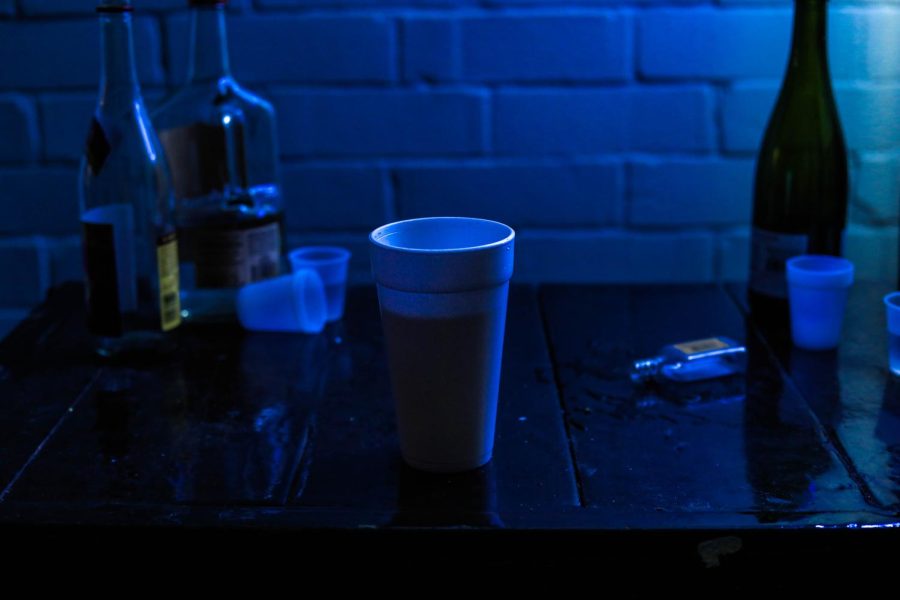Drugging incident opened up a complex disciplinary maze for one student
Photo illustration
March 17, 2022
When Rachel returned to campus last October following Hurricane Ida, she was ready to experience a normal college semester.
After spending her freshman year on Zoom because of the COVID-19 pandemic, and evacuating New Orleans for a month after Hurricane Ida in August, the biology sophomore said she felt her college experience was finally starting. That thought disappeared, however, when she received an email from Student Conduct while in a biology lab, accusing her of violating Loyola’s alcohol policy.
The charge came from an incident two months earlier, on a night when Rachel, whose name has been changed for anonymity, visited the uptown bar TJ Quills with her older brother.
Despite being underage, Rachel said she drank three alcoholic beverages throughout the night. It was towards the end of the evening, however, when she left her brother’s side for a cup of water, that things began to go wrong.
One minute, Rachel said she was standing and chatting normally with friends. The next, she was incoherent, vomiting, and unable to stand.
“I don’t remember any of this, it’s all what has been told to me,” Rachel said. “The only thing I remember is falling to the ground and thinking ‘why don’t my legs work?’”
Rachel said she was noticed by several concerned Tulane students who called the Tulane EMS, and she was taken to the hospital. While at the hospital, her brother repeatedly told nurses that he believed his sister’s water had been drugged at the bar. Despite this, nurses did not run toxicology tests, Rachel said.
Several months later, she had a hearing with student conduct.
“I figured I would go into the conduct meeting and since they were charging me with intoxication I could explain how I had been drugged and followed the amnesty policy with TEMS,” Rachel said. “I thought I would be good. Maybe I would have some community service hours to do or something, but it would be okay.”
Instead, Rachel said she left the hearing feeling blindsided and belittled. She said she remembered one member of the hearing board repeatedly telling her how “bad” her case was.
According to Loyola’s alcohol sanctioning guidelines, there is a four tier system for addressing alcohol policy violations. Rachel said she student conduct board considered Rachel’s case a level three because she required medical assistance, despite the fact that it was a drugging, not intoxication, that required the medical attention.
While in the conduct hearing, Rachel said the board referenced medical records and police reports that she did not even know existed.
Rachel said she was told alcoholic amnesty would not apply to her case, although she said she was never given a reason why.
“They had a whole case against me. I explained that I wasn’t drunk, I was drugged, and he just said he would take that into consideration,” Rachel said.
Seeking Resources on Campus
Following that first hearing, Rachel said she began searching for resources at Loyola.
Intimidated by the legal jargon of the student conduct correspondence, and terrified of the potential three semesters probation she was facing, Rachel said she turned to the Women’s Resource Center and LUPD hoping for any help with her case, but came up short.
Several weeks after her conduct hearing, Rachel said she was losing hope and the stress of the investigation was impairing her ability to perform academically.
“I was so emotionally drained and spent half my days trying to figure out what legal rights I had or what rights I had through the school. I fell behind, my GPA got worse. I was exhausted and upset all the time,” Rachel said.
Rachel said it was while running across campus trying to get access to the police report student conduct had used in her hearing that she noticed the office sign for Sharonda Williams, who was the interim Title IX coordinator for the fall semester.
“As far as I knew we had no title IX coordinator,” Rachel said. “Student conduct never told me we had one at the time.”
Williams stepped into the interim role in late August, following the departure of former Title IX coordinator Diana Ward.
The night after seeing Williams’ office, Rachel sent Williams an email begging for help with her case. She said Williams brought her into her office the next day.
According to Rachel, meeting with Williams was the first time since her conduct hearing that she did not feel abandoned by the University.
“My role as interim coordinator was to ensure that student reports and concerns were addressed properly and that investigations moved forward appropriately,” Williams said.
According to Rachel, her case was wrapped up soon after Williams got involved. Rachel said Williams shared her confusion over why amnesty was not applied to her case.
In the investigation outcome provided by student conduct, Rachel was given amnesty. A clause in the letter, however, stated that Rachel was not entitled to amnesty in any future investigations.
Akilah Jones, director of student conduct, declined to comment on why amnesty did not initially apply to Rachel’s case, or in what instances a student would not be allowed to have amnesty in the future.
“I just found that interesting because I didn’t know amnesty was something they could take away. I didn’t know they could pick and choose when students got that,” Rachel said.
An Uptown Drugging Epidemic
Rachel’s experience at TJ Quills was not unique last fall.
By October 7, Loyola Police Chief Todd Warren said eight students had been taken to the hospital after visiting TJ Quills, and many suspected being drugged.
Following a police raid at the bar, Warren sent an email to students encouraging any other victims of suspected druggings to come forward.
Rachel said she felt upset by the difference between her case and other TJ Quills druggings.
“They were sending out emails asking victims of druggings to come forward, yet my drugging wasn’t good enough for them,” Rachel said.
According to Williams, she took part in investigating the druggings both as the Title IX coordinator and as Chief Counsel for Loyola.
“My office would have been involved with responding to any Title IX complaints in that time period. As part of my role as General Counsel, I, along with Chief Warren, did meet with the owner of TJ Quill’s and her attorney to discuss reports, safety procedures and protocols shortly after the NOPD investigation that occurred there,” Williams said.
Rachel said she still struggles to understand why her case was not handled as a drugging despite the ongoing investigations into TJ Quills that took place concurrently with her case.
“Loyola always stresses that they’re there to support you, but it felt like a case where over and over again older men didn’t believe me when I was sitting there telling them my truth,” Rachel said. “I felt like the school had always acted like they would be really supportive, but then I realized there was a part of the school that was against me when I had been a victim.”










Leesa • Mar 18, 2022 at 10:48 am
If that were my child, they would not return to Loyal next semester. Absolute power play and undue stress on the student. Thankful she found counsel to give her a voice. Shame on Loyola!!
D. BRION EBEY • Mar 23, 2022 at 1:16 pm
Get the facts . Being drugged is no joke !!! But the case against Miss Rachel was held in a pathetic kangaroo court ! Loyola in the past had an excellent law school . Can some responsible person help this young woman ?